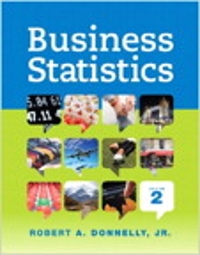Question
Mini Case Study - Chapter 2 - Tough Love As a manager with lots of experience in negotiations, you've experienced a lot of different conflicts.
Mini Case Study - Chapter 2 - Tough Love
As a manager with lots of experience in negotiations, you've experienced a lot of different conflicts. There was that one case where a worker argued that he should be allowed to smoke his (legally prescribed) marijuana at his desk. Another time, someone asked you to mediate between two executives who were having a strategic disagreementone thought that the company should invest in tulip futures, while the other thought that pork bellies were the future. But even with all of this experience, you haven't seen a case like the one going on at a Mott's apple juice factory that you've been called in to consult on.
Mott's, a division of Dr. Pepper Snapple Group, employs 305 people at its juice factory in Williamson, N.Y., near Rochester. All 305 employees, however, have been on strike for more than three months. They are protesting the fact that the company wants to make severe cuts in pay and benefitsa reduction of wages by $1.50 (about $3,000 per year), a pension freeze, a reduction in 401K contributions, and a decrease in the health insurance subsidy.
On the surface, these cuts seem to make some business sense because companies all over the world are struggling in the year 2010. But what is so unusual in this case is that Dr. Pepper Snapple Group is more profitable than it ever has been. In the last year, its net income was $550 million, a dramatic improvement from the previous year, when it lost $312 million. Because of this success, employees are accusing the company of being greedy. Stuart Applebaum, the president of the factory workers' union, says "[Dr. Pepper Snapple doesn't] even show the respect to lie to us. They just came in and said, 'We have no financial need for this, but we just want it anyway because we figure we can get away with it.'"
The company, meanwhile, defends the pay and benefits cut by arguing that its current labor costs are considerably higher than other local companies. The average pay at the Mott's plant is $21, whereas other factories and transportation companies in the area pay closer to $14. In a public statement, the company defends the move, saying in part, "As a public company, Dr. Pepper Snapple Group has a fiduciary responsibility to operate in the best interests of all its constituents, recognizing that a profitable business attracts investment, generates jobs, and builds communities."
You have been assigned to a task force with representatives from management and labor that has been charged with resolving the crisis. As all of you review the files, you realize that this is a critical case; if the employees lose, other companies might be motivated to take similar actions and cut labor costs (and increase profits) even when they are not struggling financially.
DIRECTIONS - ONLINE: You will analyze this situation as a member of the task force and answer the following questions. You will assume the position of a task force supporting the company OR a task force supporting the labor union - your choice.
Questions to Address
- What is your position? Do you represent labor or thecompany administration? What is your ultimate goal for the outcome of this conflict? Why?
- What responsibilities does the company have toward its employees? Who are the other stakeholders in this conflict? Hint - What is "fiduciary responsibility?"
- How could you help steer negotiations between labor and management so that the conflict between them is healthy and productive? Is that even possible?
- Specifically, tie your strategy back to Mary Parker Follett's contributions.
- Describe how your strategy aligns with the 5 typical conflict management styles: Yielding, Compromising, Forcing, Problem-Solving, and Avoiding. Why choose this style(s) in this unique situation?
- What are other ways to cut costs in addition to employee pay? Hint - Talk about Frank Gilbreth's contributions
- Is the company justified in trying to cut costs even when it has made a huge profit? Are the employees justified in not working to protest what they perceive as unfair cuts?
- How do the external economic conditions influence negotiations and the power dynamic?
- How might you use public perception and media presence to influence negotiations?
- As you enter into thenegotiation phase of resolving this conflict, what questions do you have for the other party in the conflict? What information would you like to know before negotiations begin? Minimum of 3.
- With a little research - What resolved the conflict? What was the final agreement? Do you feel that both sideswalked away satisfied? Why or why not?
Step by Step Solution
There are 3 Steps involved in it
Step: 1

Get Instant Access to Expert-Tailored Solutions
See step-by-step solutions with expert insights and AI powered tools for academic success
Step: 2

Step: 3

Ace Your Homework with AI
Get the answers you need in no time with our AI-driven, step-by-step assistance
Get Started


